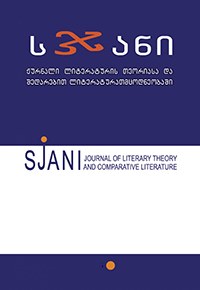ურბანული სივრცის სემანტიკა კარლო კაჭარავას პოეზიასა და ფერწერაში
Semantic of Urban Space in Karlo Kacharava’s Poetry and Painting
Author(s): Ketevan JishiashviliSubject(s): Language and Literature Studies, Georgian literature
Published by: ლიტერატურის ინსტიტუტის გამომცემლობა
Keywords: Poetry; painting; 80-ies; city; space;
Summary/Abstract: Poetry and painting of Karlo Kacharava widely represent political and econoimc situation of 80-90-ies. His works embody psycho-social aspects and cultural transformations of post-soviet urban reality as well as an impact of historic changes on the perception of everyday life of citizens. The intensity of urban trasformation effect and its powerful emotional impact was especially obsious in the capital of the country. Starting from national movement street as a central urban element gains its major importance. During political meetings the street becomes topos of power and self expression. In Karlo Kacharava’s works human existential problems and concepts of social injustice are closely linked to the space of street. Both, in his poetry and paintings street is the central space where everyday life discloses itself. However, Kacharava’s poetry is kind of day to day documantary cronicles of transitional period. Poetic images are loaded with social themes and problems of those years. In the poetry as well as in his paintings Karlo Kacharava steps back from any kind of aesthetization of reality and by the means of ugly, rough, even grotesque forms and characters constructs contemporary city image. While choosing stylistic tools the similarity to western cultures could be observed, especially with German expressionism. Parallels with post war expressionism movement could be caused by such factors as coincidence of socio-political circumstances: post war crisis, problems of poor population, psychological and moral consequences of traumatic experience etc.
Journal: სჯანი
- Issue Year: 2021
- Issue No: 22
- Page Range: 247-261
- Page Count: 15
- Language: Georgian

